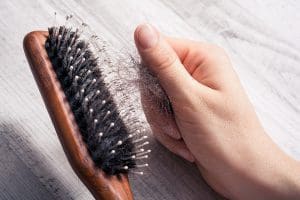The holidays are a special time of year, but the stress they can add can lead to an increase in hair shedding. Is this normal, or a sign that points to bigger problems?
The holidays are fast approaching and along with them come the joys of the season like glad tidings, great food, and time spent with family & friends. One unforeseen effect of the holiday season is the added stress that they can cause and for some individuals this can lead to stress related hair loss.
Stress can be one of hairs’ biggest enemies. They explain that as our body reacts to stress, our adrenal glands produce cortisol AKA “the stress hormone”. Individuals in a constant state of stress may have chronic elevated cortisol levels, which can lead to health issues like adrenal fatigue. A fatigued adrenal gland does not work as efficiently and can alter the production of other hormones, like DHT. Increased DHT levels have a direct effect on hair follicles and their growth cycle, even leading to hair loss.
The challenge individuals experiencing stress related hair loss often face is not recognizing the problem right away. This is because symptoms, like excessive hair shedding, occur around three to six months after the stressful period. Stress related hair loss is normally not a cause for concern, provided you have been properly maintaining your hair and scalp. With time the increased shedding should stabilize back to normal daily levels, as the normal hair growth cycle continues. In other cases, hair can begin to diffuse, growing in thinner, or become dormant.
Excessive hair shedding itself can be stressful. If not treated, it can create a perpetual cycle of stress-related hair loss. Individuals experiencing hair loss must maintain a healthy scalp to help prevent or lessen the internal effects of stress on the hair. If you have not been correctly caring for your hair and scalps’ specific needs, you could be experiencing symptoms similar to stress related hair loss, which if not treated can lead to long-term hair loss.
Holiday Stress or Something Else?
When the body consistently sheds significantly more than 80 to 100 hairs daily, a person has excessive hair shedding, which can be caused by a number of factors. These factors include increased or constant levels of stress, medications you may be taking, internal factors like hormones (menopause and pregnancy), and thyroid function or improperly caring for your hair and scalp. In some cases, hair can recover and return to its normal growth cycle. In other cases, hair can begin to diffuse, growing in thinner, or become dormant.
Prevent With ScalpCheck
Instead of trying to self-diagnose whether your hair shedding is from excess stress or something more, Jeffrey Paul’s team of trichologists can help you discover the health of your hair and scalp with their exclusive ScalpCheck. This in-depth analysis begins by looking at your current hair care and styling routine, as well as key contributing factors like diet, lifestyle, certain medications and heredity. Next, using proprietary TricoTest software, along with non-invasive, non-surgical medical appliances and three different camera magnifications, they identify the scalp’s levels of oil, hydration and pH, which all play an important role in the health of the hair and scalp and hair shedding. Once your ScalpCheck is complete, a customized treatment plan is created based on what’s best for your specific hair and scalp condition.
Not Just for Shedding from Stress
ScalpCheck is not only designed to detect hair shedding problems like shedding related to stress. It is also ideal for anyone suffering from dandruff, excessive scalp itch, oily hair, and those who are looking to prevent an issue before it occurs.



